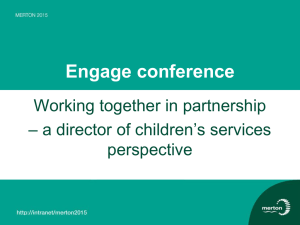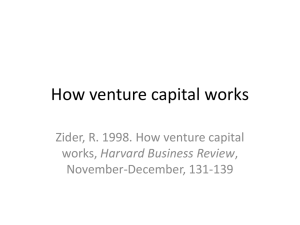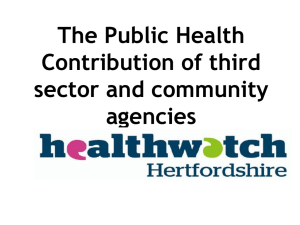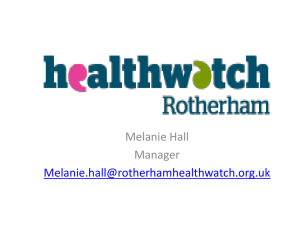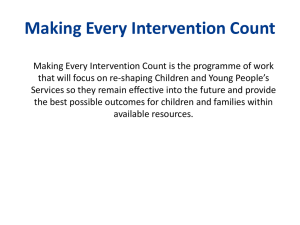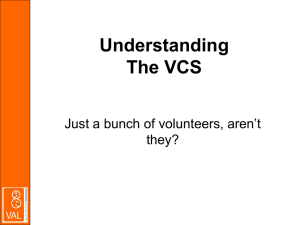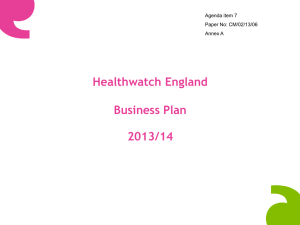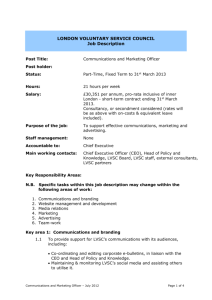Engagement and support report Sept 2013
advertisement
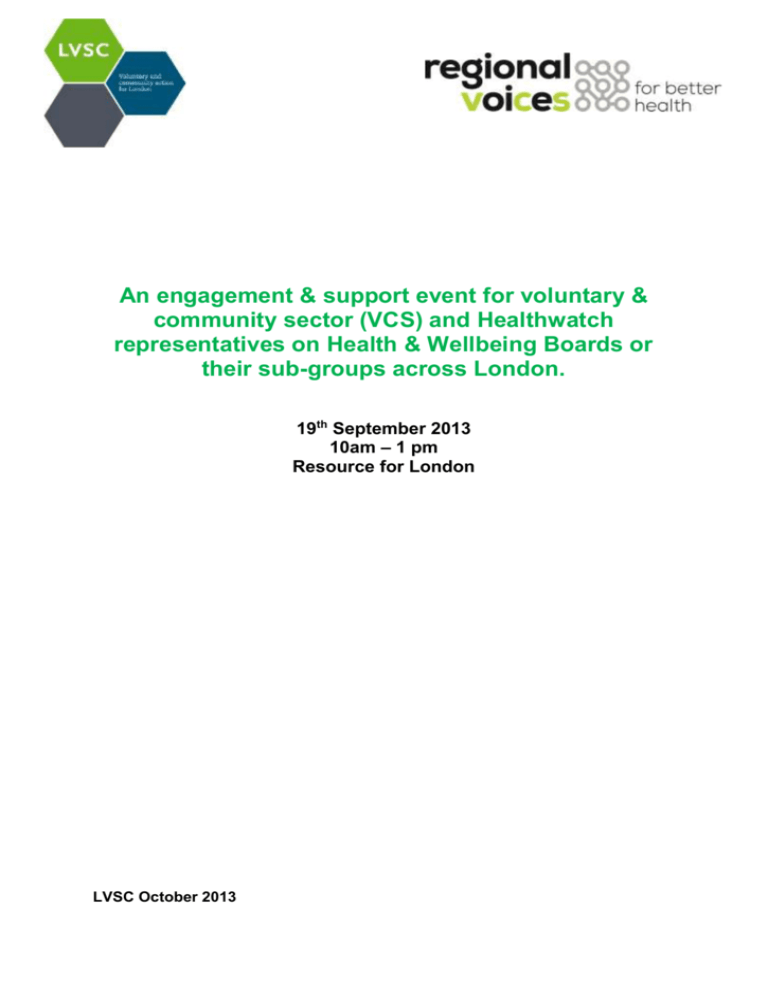
An engagement & support event for voluntary & community sector (VCS) and Healthwatch representatives on Health & Wellbeing Boards or their sub-groups across London. 19th September 2013 10am – 1 pm Resource for London LVSC October 2013 Present Ann Hayes Brigid Brennan Bryan Smith Donald Roy Gordon Owen Kathryn Williamson Laura Luckhurst Michael Kerin Olive Hamilton- Andrews Pat Kenny Patricia Turner Shane Britton Shepetim Alimeta Varsha Dodhia Vivien Giladi Workers Educational Organisation Royal Voluntary Service (RVS) ISS FS Education Healthwatch Wandsworth Project @Messrs G Owen & Co Richmond CVS Greenwich Action for Voluntary Service St Joseph Hospice Redbridge Health & Wellbeing Board Revolving Doors Kingston Voluntary Action Revolving Doors Agency Refugee Council Namaste Care Voluntary Sector Enfield Speaker Dr Paul Plant, Public Health England (London Team) Facilitators /note takers Alison Blackwood - LVSC Sandra van der Feen - LVSC 1) Introductions and overview of the two year project Regional Voices (including LVSC for London) has been awarded funding from the Department of Health’s Innovation, Excellence and Strategic Development fund (IESD) to support effective voluntary and community sector (VCS) and Healthwatch engagement with Health and Wellbeing Boards (HWB), both where there is a VCS representative on the board and where there isn’t. The programme, which will run for two years aims to: Support effective VCS & Healthwatch engagement on and with Health and Wellbeing Boards; Create a learning exchange network to share good practice that supports individuals, board structures and government; and Develop effective and robust routes for dissemination and collation of information to support HWBs through support meetings (two per year), online updates and, where appropriate, resource development The overheads from the presentation can be found here 1 The 33 Health & Wellbeing Boards in London – all different in structure and membership – participants share their experiences in their local areas 2) Kingston Voluntary Action - Healthwatch and VCS sit on the HWBB and both have voting rights. Both Healthwatch and KVA sit on JSNA Working Group. Kingston VCS Strategy in partnership with local authority Redbridge - Have community representatives and CVS involvement. Two meetings have taken place. The JSNA is being refreshed Greenwich CVS - Are delivering Healthwatch. Supports Healthwatch and VCS representatives. Healthwatch has a place on the HWBBB but there is no VCS representative Newham - interest in Homelessness but Newham has scatty information on the HWBB – not come together Enfield - elected VCS rep on HWBB. Health lead of Enfield of 50s sits on the JSNA Strategy Group and writes report for the CVS newsletter which has a good reach. Richmond CVS - HWBB only has statutory member (Healthwatch). Is lobbying for representation. Good relationship and VCS involved to a degree but want to engage and communicate with Board more. Hackney - Had good shadow Board. Both Healthwatch member and designated VCS representation. There is also a Health & Social Care Forum and VCS members are nominated through that Forum. St Joseph Hospice sits on HWBB Working Groups at officer level. People feel quite engaged but integration of services only privately discussed. Question on how effective the process really is. Refugee Council Health Befriending Project - Wants closer links with JSNAs, CCGs and Healthwatch. There are links with the local Healthwatch but difficult to get issues taken forward. There is little capacity for small refugee organisations to put into the agenda Workers Educational Organisation - Deliver community interpreting and training including people who become reps on Hackney LINk. Would like greater understanding of the HWBBs and involvement Revolving Doors Agency - London based: complex needs – links to HWBB and want to influence. Used group feedback to try and get them involved. Revolving Doors - member of Camden Healthwatch. Slowly getting there. Healthwatch Wandsworth - Works quite well allowing individual members, which is quite unusual. HWBB is quite restricted – Healthwatch members not allowed a vote. There are no VCS reps. Councillors and Clinical Commissioning Groups (CCG) reps have voting rights, but officers don’t. Local Partnership Board is large with up to 60 organisations including VCS. Harrow Healthwatch - Varshia is Chair. Healthwatch has seat but some members have voting rights, whilst others don’t (Healthwatch does but officers don’t). Good shadow Board – which makes big decisions. North West London “Shaping a Healthier Future”. (involves 8 CCGs and hospitals and 7 local authorities – have to work closely together 2 Group discussion Key issue of concern: Some HWBBs have no voting rights except for clinical members and councillors (e.g. Wandsworth) – this is a big issue of concern There are high expectations from the reps – can they be realistically met? What are the issues for reps and where there is no VCS representation? What needs to be done to ensure engagement? Enfield has good democratic process Hackney – not one way into the system – different structure, but well established Health Forum – organises steering group meetings to facilitate better engagement Priorities are very broad in some areas but more specific in other areas Carry out information to groups through mail-outs There is engagement in Wandsworth – have a forum but loudest voices dominate Use “soft power” to try and engage Signpost to facilitate engagement Need accessible information at day centres, homeless centres etc. The places are there but not the information to facilitate engagement Information needed for local people to engage – needs posters and flyers What are the gaps? Range of cultures and groups – different needs How accountable? – discussions in public – some opportunities to feed in, but how/where are the HWBBs held to account? Lack of VCS representation Hard to reach communities – elderly Isolated groups – e.g. BAMER, older people (e.g. housebound) – they have no access to internet and are therefore hard to reach. Enfield VCS need to support them Loudest members of Forums dominate (see above) “Least popular” groups hard to engage The LVSC Who’s Who guide for London provides contact details of the representatives on the HWBBs. Please notify us if you can provide us with further contact details as the guide needs updating regularly 3) Table discussion 1) What is the value of meeting at a London wide level? Virtual – look at Pan London initiatives like Mayor London Health Board Not sure because of the wide variety of different approaches – except to focus on specific key issues and for trying to develop a London wide picture of priorities 3 2) Helpful to have informative speakers that at borough wide level we may not have access to Useful for sharing good practice and encouraging joint working How is the re configuration across London impacting neighbouring regions? Might be worth finding out for organisations that cover other regions What can LVSC do to help HWBB reps? Sharing resources and information through the 33 boroughs Sharing information from the Academic Health Networks Practical things – policy updates (or pointing them out) Explain the commissioning cycle Influencing skills training Continue to engage with VCS Provide more explanation of terms, of new organisations for the non- health sector people Steer for more joint working so that the strategic issues can be addressed How can LVSC help Londoners feed into the London Health Board? Development of the Who’s Who guide – create a echelon borough by borough so we can see connectivity 3) What can LVSC do to help VCS engage with health and care in London? Provide more engagement with different HWBBs in London as it seems like there is a wide gap on representation and equal voice Provide comprehensive summaries /briefings of topical information that would be helpful to the VCS Link up with CCGs and Public Health in order to feed in the concerns of the sector Look at issues regarding the pressure on care homes for care and financial sustainability in terms of local authority purchasing /tariffs Workforce development in social care – staff training 4) What should we be lobbying about? Lobby for VCS engagement at all levels – citing good examples – e.g. where they exist Lobby for increased and effective representation and involvement of VCS in HWBBSs and relevant sub groups Lobby for increased links between HWBBs especially in same geographical areas Press for greater uniformity (based on good practice) across London Specialist commissioned services across London via NHS England, including cancer services Community representation on the London Health Board Living wage /zero hour contracts Living wage /zero hour contracts How to influence health policy and investment in London? 4 4) Dr Paul Plant: Deputy Director Health Improvement, Public Health England (London region): London Health Board Paul Plant’s presentation can be downloaded here Paul’s team: aim: to keep people healthy; helping the new commissioning landscape and gathering health intelligence Yvonne Doyle – Advisor to the London Mayor, Regional Director of Public Health No direct interaction with VCS directly, but everything in new health and social care system is done at a local level. VCSs need to connect with their local Directors of Public Health, HWBBS and CCGs VCS have good understanding of the wider social determinants of health – how to get that into the system. We have a strong commitment to work with VCS – how work with the public? Priorities for HWBBs – some only on individual websites; some come from the NHS; others describe the areas differently. Big issue is mental health, also obesity, mainly focusing on children. Mental health – focus on first 6 months of life (including mental health of parents); adolescence and resilience. GLA published business case for: economic investment in early years Academic Science Networks work on integrated mental health programmes. There are 15 AHSNs – 3 in London: South London Academic Health Science Network. North East and North central London (UCL) AHSN and Imperial College Health Science Centre JSNA – topic refreshing over time. They are comprehensive but at different stages of development London Health Board – London Mayor is the Chair. The Health Science Networks are involved. Social care is part of its focus – e.g. making the case for investing in social care in London (see also overheads and website Questions /issues of concern: Where is the connectivity between all the sections and where is the voice of reality? How to get the work on the ground at a regional level? Answer: the Boards aims to help to improve the system and make the links and help improve primary care. However, the Board is not a representative body or intended to be. It is not a structure like the HWBBs – this Board doesn’t make decisions. There is no budget associated with the Board and it doesn’t have a commissioning role Children’s budgets are very low as work on safeguarding takes all: Children & Young People VCS organisations are really struggling. Answer: GLA will publish international evidence on return on investment on prevention and early years in November this year. Social justice will feed into the economic model. This should help with evidence base to present to commissioners Figures on homelessness and overcrowding – is that being looked anywhere? Doesn’t seem to be on any policy agenda because of the 5 economic downturn. It’s becoming a bigger issue and is an inequality issue. Answer: there is Marmot report on this – Indicators for HWBBS, Hackney and Lambeth pilots across 4 boroughs. Work with boroughs and use resources e.g. on London Health Observatory which is part of Public Health England. See also Government Public Outcomes Framework (2013-2016) 5) Way forward – actions for LVSC and Regional Voices Regional Voices will: Discuss the key issues, concerns and recommendations raised at all regional events with the regional voices partners, including LVSC, to ensure effective and appropriate support and resources for VCS and Healthwatch members of HWBBs in all the regions Develop an online network that takes on board the suggestions /recommendations made at the individual Regional Voices’ events and produce, share and/or build on resources and good practice where appropriate Publish the results of the recent on-line survey of VCS and Healthwatch members of the HWBBs Lobby for VCS representation and equal voice on all the HWBBs. Lobby for voting rights of Healthwatch members of the HWBBs Build on the links developed with CCGs, including CCG Support Units as well as HWBBs LVSC will: Publish and disseminate a short event report to all participants and through the new monthly Influencing support bulletin Share the key issues raised at this event with the Regional Voices’ counterparts to ensure effective support to VCS and Healthwatch members of HWBBs and their sub groups Signpost VCS and Healthwatch representatives to relevant London wide information/resources/good practice in the monthly e-bulletin – e.g. information from the 3 London Academic Health Science Networks, London Health Board, etc Signpost VCS and Healthwatch representatives to local HWBB good practice and case studies where appropriate Develop an on-going dialogue with the London Health Board so that issues, concerns and evidence from VCS and Healthwatch members are taken forward Liaise with Regional Voices to ensure that relevant and accessible information is produced and disseminated, including posters and leaflets where relevant Lobby for the issues as raised by participants Produce /adapt relevant jargon free summaries/briefings where appropriate which are also relevant for non-health sector organisations Signpost reps to influencing skills training Coordinate a second engagement & support event for March 2014 6
